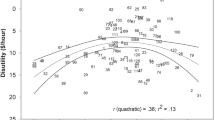Abstract
Ninth graders rated their degree of liking for each of 12 striving tasks and, on another occasion, rated their perceptions of the similarity between each pair of tasks. Analyses of variance revealed strong PersonX Task interactions, suggesting the possibility of individual differences in task preference generality. A derived measure of task preference generality-specificity related significantly to an overall measure of perceived task similarity—“generalizers” saw the tasks as being more similar than did “specifiers.” Investigation of individual differences in degree of cross-situational generality was suggested as a way to integrate “trait” and “situational” theories of behavior.
Similar content being viewed by others
References
Allport, G. W.Personality. A psychological interpretation. New York: Holt, 1937.
Attneave, F. Dimensions of similarity.American Journal of Psychology 1950,63 516–556.
Bandura, A., & Walters, R. H.Social learning and personality development. New York: Holt, Rinehart & Winston, 1963.
Bem, D. J., & Allen, A. On predicting some of the people some of the time: The search for cross-situational consistencies in behavior.Psychological Review 1974,81 506–520.
Brunswik, E.Perception and the representative design of psychological experiments. Berkeley: University of California Press, 1956.
Burton, R. V. Generality of honesty reconsidered.Psychological Review 1963,70 481–499.
Campus, N. Trans-situational consistency as a dimension of personality,Journal of Personality and Social Psychology 1974,29 593–600.
Carroll, J. D., & Chang, J. J. Analysis of individual differences in multi-dimensional scaling via an N-way generalization of “Eckart-Young” decomposition.Psychometrika 1970,35 283–319.
Cottrell, L. S., Jr. The analysis of situational fields in social psychology.American Sociological Review 1942,7 370–387.
Coutu, W.Emergent human nature. New York: Knopf, 1949.
Crandall, V. C.Parents' influences on children's achievement behavior. Progress report, USPHS grant no. MH-02238. Fels Institute, Yellow Springs, Ohio, 1965.
Crandall, V. C., & Battle, E. S. The antecedents and adult correlates of academic and intellectual achievement effort. In J. P. Hill (Ed.),Minnesota symposia on child psychology (Vol. 4). Minneapolis: University of Minnesota Press, 1970, Pp. 36–93.
Dodd, D. H., & Schultz, R. F., Jr. Computational procedures for estimating magnitude of effect for some analysis of variance designs.Psychological Bulletin 1973,79 391–395.
Ekehammar, B. Interactionism in personality from a historical perspective.Psychological Bulletin 1974,81 1026–1048.
Endler, N. S., & Hunt, J. McV. S-R inventories of hostility and comparisons of the proportions of variance from persons, responses, and situations for hostility and anxiousness.Journal of Personality and Social Psychology 1968,9 309–315.
Endler, N. S., & Hunt, J. McV. Generalizability of contributions from sources of variance in the S-R inventories of anxiousness.Journal of Personality 1969,37 1–24.
Gardner, R. W., & Schoen, R. A. Differentiation and abstraction in concept formation.Psychological Monographys, 1962,76 (41, Whole No. 560).
Hammond, K. R. Representative vs. systematic design in clinical psychology.Psychological Bulletin 1954,51 150–159.
Hartshorne, H., & May, M. A.Studies in the nature of character. Vol. 1: Studies in deceit. New York: Macmillan, 1928.
Kelly, G. A.The psychology of personal constructs. New York: Norton, 1955.
Kogan, N., & Wallach, M.Risk taking: A study in cognition and personality. New York: Holt, Rinehart & Winston, 1964.
Lewin, K.Dynamic theory of personality. New York: McGraw-Hill, 1935.
Mischel, W.Personality and assessment. New York: Wiley, 1968.
Mischel, W. Toward a cognitive social learning reconceptualization of personality.Psychological Review 1973,80 252–283.
Nelson, E. A., Grinder, R. E., & Mutterer, M. L. Sources of variance in behavioral measures of honesty in temptation situations: Methodological analyses.Developmental Psychology 1969,1 265–279.
Rotter, J. B.Social learning and clinical psychology. Englewood Cliffs, New Jersey: Prentice-Hall, 1954.
Scott, W. A. Cognitive complexity and cognitive flexibility.Sociometry 1962,25 405–414.
Sermat, V. Is game behavior related to behavior in other interpersonal situations?Journal of Personality and Social Psychology 1970,16 92–109.
Slovic, P. Information processing, situation specificity, and the generality of risk-taking behavior.Journal of Personality and Social Psychology 1972,22 128–134.
Solomon, D. The generality of children's achievement-related behavior.Journal of Genetic Psychology 1969,114 109–125.
Vannoy, J. S. Generality of cognitive complexity-simplicity as a personality construct.Journal of Personality and Social Psychology 1965,2 385–396.
Wallach, M. A. On psychological similarity.Psychological Review 1958,65 103–116.
Winer, B. J.Statistical principles in experimental design. New York: McGraw-Hill, 1971.
Author information
Authors and Affiliations
Additional information
Data collection and initial data analyses for this study were conducted under the auspices of the Institute for Juvenile Research, Chicago, Illinois. Gratitude is expressed for the cooperation of the staffs and students at St. Michaels and Immaculata high schools, Chicago; for useful discussions of theoretical issues with Mark Oberlander; and for much assistance with data analysis provided by Arthur Kendall.
Rights and permissions
About this article
Cite this article
Solomon, D. Perceptions of similarity between striving tasks and the generality of task preferences. Motiv Emot 1, 181–192 (1977). https://doi.org/10.1007/BF00998519
Issue Date:
DOI: https://doi.org/10.1007/BF00998519




